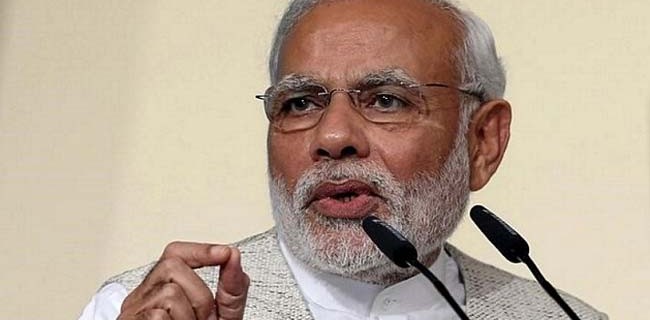A Modi Lecture Berating Tax Breaks For Rich Rattles India Funds

In the run-up to India’s annual budget, a speech last month by Prime Minister Narendra Modi has become the focus of this year’s market chatter, unsettling some investors.
Many local mutual funds, who bought record Indian stocks in 2015 just as foreigners were fleeing, fear Modi may dilute a tax break on equity gains, curbing inflows. Setting off the alarm was Modi’s tirade at a business summit on Jan. 29 against “experts” who disdain subsidies for the poor but are quick to welcome tax breaks for businesses.
At stake for money managers is a favorable tax regime that helps millions of investors channel their savings into the stock market. As the benchmark S&P BSE Sensex tumbled into a bear market, mutual funds have helped counter outflows spurred by the U.S. rate outlook and the turmoil in China. Their plea now to Modi: Don’t screw it up.
“Such a move won’t be positive for equities when the market sentiment is down,” Sunil Subramaniam, chief executive officer at Sundaram Asset Management Co., which oversees $3.2 billion, said in an interview in Mumbai. “Equity being risk capital needs incentives to persuade people to save.”
Money managers are concerned Finance Minister Arun Jaitley, in his budget on Monday for the fiscal year starting April 1, may tax profits from stocks sold within three years of purchase, instead of one year applicable now. At present, gains from equity investments held for less than 12 months attract a tax of 15 percent. Several local media including the Economic Times reported the government is weighing an increase in the holding period for the capital-gains tax waiver after Modi’s speech.
The fear has played its part in putting the S&P BSE Sensex on course for its steepest monthly drop since November 2011. The gauge traded little changed on Thursday. Finance Ministry Spokesman D.S. Malik declined to comment on the speculation, saying budget discussions are confidential. After buying $10.2 billion of shares in 2015, local funds have put $2.9 billion into equities this year. Overseas investors have withdrawn $2.3 billion.
Making the tax exemption less attractive may accelerate the shift to bond funds, which got 150 billion rupees ($2.2 billion) in January, the most since October, data from the Association of Mutual Funds in India show. Inflows to stock funds was the smallest in 21 months, the data show.
Retail investors have been a force behind mutual funds’ growing heft since Modi took office in May 2014. As many as 3.4 million accounts were opened in the April-January period, versus 2.5 million in the year through March 2015, data from the regulator show.
“This is really a wrong time to do it,” Sridhar Sivaram, investment director at Mumbai-based family office Enam Holdings Pvt., said by phone on Tuesday. “Retail investors are coming back and funds have started to see inflows. All of this can reverse.”
In his speech at the summit organized by the Economic Times daily in New Delhi, Modi compared subsidies for the poor with tax breaks for the rich. The federal budget for the year that started April 1, 2015, put the subsidy bill at 2.43 trillion rupees.
“When a benefit is given to farmers or to the poor, experts and government officers normally call it a subsidy,” he said. “However, I find that if a benefit is given to industry or commerce, it is usually called an ‘incentive’ or ‘subvention.’ We must ask ourselves whether this difference in language also reflects a difference in our attitude? Why is it that subsidies going to the well-off are portrayed in a positive manner?”
The market is reading too much into those comments that weren’t made in the context of the budget, said Gautam Chhaochharia, head of research at UBS Securities India Pvt. in Mumbai. “There isn’t any credible insight from the finance ministry on it,” he said.
Still, investors including Enam’s Sivaram say the securities transaction tax, a same-day tax credit system introduced in lieu of long-term capital gains tax in 2005, is efficient. Should the long-term capital gains tax break be diluted, the damage to share prices may exceed any revenue gain for the government, he said.
The STT has on average fetched the government 60 billion rupees annually in the past six years, according to budget documents. The levy is in addition to brokerage on trades done on exchanges, and sale and purchase of equity funds. Revenue gain from extending tenure of the capital gains tax is difficult to predict, said Sudhir Bassi, executive director at law firm Khaitan & Co. in Mumbai.
“If you can’t boost the market, at least don’t take anything away,” Vikram Kotak, managing partner at Crest Capital & Investment Pvt. in Mumbai, said in an interview with Bloomberg TV India. “That’s what I would say to the government.”
Source: NDTV





























